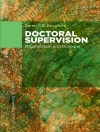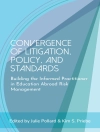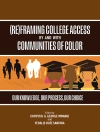The dream of public higher education in America is to provide opportunity for many and to offer transformative help to American communities and the economy. Expanding Opportunity in Higher Education explores the massive challenges facing California and the nation in realizing this goal during a time of enormous demographic change. The immediate focus on California is particularly appropriate given the size of the state—it educates one out of every nine students in the country—and its checkered political record with respect to civil rights and educational inequities. The book includes essays not only by academics looking at the state’s educational system as a whole, but also by those within the policy system who are trying to keep it going in difficult times. The contributors show that the destiny of California, and the nation, rests on the courage of policymakers, both within the universities and within the government, to move aggressively to reclaim the hope of millions of students who can make enormous contributions to this society if only given the chance.
Mục lục
1. Introduction: Creating a 21st-century Vision of Access and Equity in Higher Education
Patricia Gándara and Gary Orfield
Part 1. The Role of K-12 Education in Access and Opportunity in Higher Education
2. California Opportunity Indicators: Informing and Monitoring California’s Progress Toward Equitable College Access
Jeannie Oakes, Julie A. Mendoza, and David Silver
3. Lowering Barriers to College Access: Opportunities for More Effective Coordination of State and Federal Student Aid Policies
Brian K. Fitzgerald
4. The Role of Advanced Placement and Honors Courses in College Admissions
Saul Geiser and Veronica Santelices
5. K-12 and the Pipeline to Higher Education
Charles A. Ratliff
Part 2. The Role of Higher Education in Creating Access and Opportunity
6. Measuring the State of Equity in Public Higher Education
Estela Mara Bensimon, Lan Hao, and Leticia Tomas Bustillos
7. Reaping the Benefits of Grutter: College Admissions and Racial/Ethnic Diversity
Catherine L. Horn and Patricia Marin
8. The Effectiveness of the Transfer Path for Educationally Disadvantaged Students: California as a Case Study in the Development of a Dual Admissions Program
Stephen J. Handel, Margaret Heisel, and Barbara A. Hoblitzell
9. A Strengthened Community College Role in Teacher Preparation: Improving Outcomes for California’s Minority Students
Nancy Shulock and Colleen Moore
10. The Educational Pipeline and the Future Professorate: Who Will Teach California’s and the Nation’s Latino and African American College Students?
Jorge Chapa
11. Access in California Higher Education: The Promise and the Performance
Bruce D. Hamlett
Conclusion: Fateful Decisions
Gary Orfield and Patricia Gándara
About the Contributors
Index
Giới thiệu về tác giả
Patricia Gándara is Professor of Education at the University of California at Davis. She is the author of
Over the Ivy Walls: The Educational Mobility of Low-Income Chicanos and the editor of
The Dimensions of Time and the Challenge of School Reform, both also published by SUNY Press.
Gary Orfield is Professor of Education and Social Policy at Harvard University and has published many books, including
Dropouts in America: Confronting the Graduation Rate Crisis.
Catherine L. Horn is Assistant Professor of Educational Leadership and Cultural Studies at the University of Houston and the coeditor (with Gary Orfield and Patricia Marin) of
Higher Education and the Color Line: College Access, Racial Equity, and Social Change.












